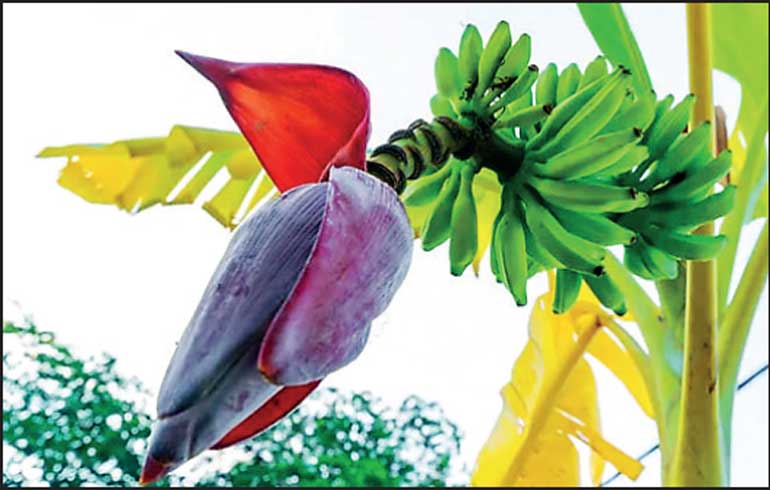Wednesday Feb 18, 2026
Wednesday Feb 18, 2026
Wednesday, 28 August 2024 00:02 - - {{hitsCtrl.values.hits}}


Beyond its textural appeal, banana blossoms offer a range of nutritional benefits for the health-conscious consumers seeking plant-based alternatives
By Rasangi De Silva
The plant-based food scene is constantly evolving, and a new contender is emerging from its floral sheath: the banana blossom (known as kehelmuwa in Sinhala). Once a staple in many traditional Sri Lankan households, this vibrant purple flower, found at the end of banana clusters, while often overlooked, is gaining traction internationally as a versatile and sustainable alternative to meat.
More than just a pretty flower: While typically discarded, the banana blossom boasts a surprising resemblance to fish in both texture and flavour. Once prepared by removing the outer layers and parboiling, the inner core takes on a flaky, meaty texture. This unique characteristic has made it a popular choice for creating vegan versions of fish and shellfish dishes and the perfect alternative for individuals with seafood allergies.
A nutritional powerhouse: Beyond its textural appeal, banana blossoms offer a range of nutritional benefits for the health-conscious consumers seeking plant-based alternatives. They are rich in fibre, vitamins A, C, and E, and contain essential minerals like potassium and magnesium.
Sustainable and eco-friendly: As concerns about the environmental impact of animal agriculture rise, the banana blossom presents a compelling alternative. Banana trees require minimal resources compared to meat production, making them a more sustainable choice. Additionally, their cultivation can contribute to agricultural diversity and support local communities in banana-growing regions.
Culinary canvas: The culinary possibilities with banana blossoms are vast. From “fish” tacos and curries to vegan “crab” cakes and dumplings, the neutral flavour profile allows it to take on a variety of spices and seasonings. This versatility empowers chefs and home cooks to explore their creativity and create delicious plant-based dishes. The internet is already full of innovative dishes incorporating banana blossoms, showcasing its potential as a versatile and delicious ingredient across regions.
Ready for its global debut: While banana blossoms are a staple in Southeast Asian cuisine, their unique qualities are capturing the attention of the global food market. Supermarkets are beginning to offer pre-prepared ready-to-eat options, and restaurants are featuring innovative banana blossom dishes on their menus. As awareness grows and accessibility improves, banana blossoms are poised to become a mainstream plant-based ingredient.
Blooming the future of Sri Lanka: With its sustainable qualities, nutritional profile, and culinary potential, the banana blossom is poised to become a major player in the plant-based food revolution. As consumers continue to seek delicious and responsible alternatives, this hidden gem is ready to blossom onto plates around the world.
Sri Lanka, with its abundant banana cultivation, is uniquely positioned to be able to capitalise on the growing global demand for plant-based alternatives, particularly the sustainable, delicious, and versatile banana blossom. The country’s tropical climate provides ideal conditions for year-round cultivation, ensuring a consistent supply of high-quality blossoms. By investing in research, promoting value-added products, and supporting local entrepreneurs, Sri Lanka can become a global hub for banana blossom production and export, promoting sustainable agriculture, and contributing to the global shift towards plant-based diets.
Moreover, integrating banana blossoms into the local culinary landscape can create new markets to drive the economic growth. Educating the international consumers about the nutritional benefits and culinary versatility of this ingredient is crucial for increasing demand. By working closely with farmers, processors, and the culinary industry, Sri Lanka can harness the full potential of banana blossoms and contribute to a more sustainable and plant-based future.
(The writer is a marketing and communication professional.)